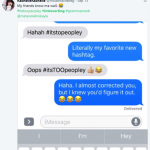
Are you an introvert who hates conflict? There are a lot of us. Just like talking on the phone, hating conflict is a common characteristic of card-carrying introverts. I’m no different.
Like many introverts, I hate the idea of rocking the boat. I prefer to avoid drama at all costs. In the past that meant hiding from uncomfortable situations altogether.
In my 20s, when I had roommate dramas (which was inevitable considering I had six roommates at one point!) I would go out of my way to avoid the roommate I was having issues with. If they were in the kitchen or living room I’d hide out in my room until I knew the coast was clear.
While avoidance can be effective for a little while, it doesn’t work in the long term. It’s especially unproductive in work settings and romantic relationships. Bosses want team members who can deal with conflict in a constructive way. In romantic relationships, open communication is the cornerstone of emotional intimacy.
So how can you deal with conflict as an introvert without creating unnecessary drama? And how can you do it in a way that actually strengthens your connection to the other person?
As an introvert coach specializing in confidence and communication I’ve worked with hundreds of introverts who hate conflict as much as you likely do. Here’s what I’ve learned from years of refining my own conflict resolution skills, and helping other innies to do the same.
7 Ways to Deal With Conflict as an Introvert
Make sure there actually is a conflict
How many arguments have you had just in your own head? It’s natural for the mind to run wild with stories when you feel like your friend or colleague is treating you differently. The reality is that their actions may have nothing to do with you. Case in point:
The other day, I went to message a somewhat new friend on Facebook to see if they wanted to hangout. When I looked her up I noticed that her profile no longer showed up. My stomach dropped. Had she blocked me?
All evidence implied that she had. My mind started racing. What had I said or done to offend her? Luckily, I knew that sitting and stewing in my own worries and made-up scenarios was NOT the best way to deal with conflict. Read on to find out what I did instead.
Take a pause
It can be tempting to react too quickly in the face of conflict. Before you know it you’ve sent a defensive text message or blocked the person on every social media channel. Before you push that send or block button, take a little time out. Go for a walk or sleep on it and address things when you’re not feeling so emotionally triggered. This is exactly what I did before I messaged the friend who appeared to have unfriended me on Facebook.
Address things in a straightforward way
The root of most conflict is miscommunication. That’s why it’s SO important to get things out in the open instead of allowing the conflict to grow inside your head like a weed.
It’s best to approach it from the angle of curiosity. Curiosity asks questions rather than making accusations. It might say something like, “I noticed that you’ve been acting differently. Is everything ok with us?”
In the case of my friend who unfriended me, I decided to send her a text message:”I was just going to message you to see if you wanted to hang out and I noticed that you unfriended me on Facebook. I’m wondering what this is about? Maybe I can address it.”
She texted me back right away to say that she’d deleted her Facebook account because she was starting a new job and didn’t want the dumb posts she’d made in her twenties to sabotage her. Oh.
Turns out the conflict was all inside my head and I never would’ve recognized this if I hadn’t addressed things in a straightforward (but friendly) way.
Consider the other person’s state of mind
As self-reflective introverts it can be easy for us to project our fears and insecurities onto others. You might jump to the conclusion that a colleague or friend’s cold behaviour means that they hate you.
But they’re behaviour may be different for reasons unrelated to you. Is it possible that they’re just tired and stressed out because of things they’re dealing with in their personal life?
Again, the fastest way to figure out why the other person is treating you differently is to get curious. Ask them how their day or week is going. If you know them well, you might ask how their partner and family are doing.
Use softening statements
When it’s time to address the conflict in words you may find it difficult to know what to say. Like a lot of introverts, you might struggle to articulate your frustrations.
The first step to dealing with conflict without causing drama is to use softening statements. You might say something like…
- I know this wasn’t your intention…
- I know you probably didn’t realize this…
- Your friendship means a lot to me, which is why I wanted to let you know…
Make it about you
One of the most challenging things about being an introvert is feeling like we’re not heard. Conflict can amplify this sense of being unheard and misunderstood.
The thing about conflict is that it puts people on the defensive. When they’re in defensive mode, they can’t hear what you’re trying to say.
Make sure that the other person stays open and receptive to what you’re saying by making it about YOU. Use ‘I feel’ statements rather than pointing a finger.
- I’m feeling uncomfortable about…
- When xyz happened it made me feel sad because…
- When someone does xyz it frustrates me because….
Notice how in the last example I said “someone” rather than “you”. The more you can avoid saying “you” during the conversation the easier it will be to get through to the other person.
Know when to drop it
Part of dealing with conflict is knowing when it is resolved. Once you’ve communicated your main points, avoid repeating yourself. If you’ve used the above steps, the other person should understand where you’re coming from by now.
If they still don’t get it, take a pause and come back to the conversation later. If they’ve apologized and resolved to do better it’s time to drop the issue so that you don’t risk putting them on the defensive.
Smart communication skills for introverts
I help introverts achieve confidence, connection and conversation skills WITHOUT overwhelm and ‘faking it till you make it’. If you want smart, introvert-specific conversation tips, grab my free Introvert Conversation Cheat Sheet.
Love,
Michaela
P.S. If you’re new to the blog, allow me to introduce myself. I’m Michaela Chung, author of The Irresistible Introvert and The Year of The Introvert, and creator of this amazing innie community we have here. For several years, I’ve been building up a labyrinth of introvert resources that will take you on a magical journey toward more confidence, connection, and self-love. Start with this free Introvert Connection Guide.










